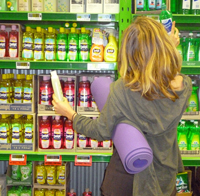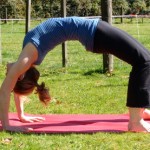by Lucinda Staniland
You’ve just finished your Thursday night yoga class. You’re feeling blissed out and relaxed after a good long savasanna, and now you’re heading homewards. On your way you stop in at the supermarket to grab a few crucial things.
Wandering through the brightly lit aisles you have some decisions to make: do you buy the dishwashing liquid that contains surfactants, stability and dispensing aids, fragrances and colors, mildness additives, preservatives and antibacterial agents, all of which can be toxic to aquatic organisms, and phosphates, which cause algal blooms, for $3 a bottle?
Or do you choose dishwashing liquid made of mineral salts with plant based ingredients derived from coconut and citrus oil for $6 a bottle?
There are other choices to make too – free range organic eggs or cage eggs? Wild venison or cheap chicken? Synthetic strawberry shampoo, or the organic plant based variation?
Standing there under the fluorescent lights in your post-yoga glow you might be thinking;
Does the candlelit yoga practice I’ve just experienced have anything to do with the choices I have to make while shopping?
Short answer, Yes. Our shopping choices have everything to do with our yoga practice. In fact, our yoga practice isn’t really yoga if we’re not being conscious consumers.
Our day-to-day lives are full of choices, particularly in regard to the things we buy and consume.
We consume, among other things; food, clothing, shower gel, perfume, jeans, mince pies, tea towels, plastic wrapped chicken breasts, fridge magnets, alarm clocks, designer watches, polar fleeces, laptops, yoga mats, and, of course, dishwashing liquid.
Consuming in itself doesn’t necessarily have to be a bad thing. We have to consume things in order to survive. But how we consume is important. And this is where yoga comes in.
When we practice yoga, it’s hard to listen to all this talk about mindfulness and compassion and ‘we are all one’, and not apply those practices to how you live your everyday life.
A yoga practice has helped me realise the products I consume affect other people and other living beings way beyond the impact on my wallet.
Conscious consumption is never as simple as just getting the cheapest price, or the sparkliest dishes.
As consumers, we are disconnected from the consumer product cycle of life – what they are made of, who makes them, what the environmental effects are of making and using them, and where they go once we’re done with it.
Most of us don’t know where our stuff goes when we throw it away, we don’t know who sorts through it and dissembles it, and we don’t know whether it decomposes, leaches toxins into the earth, or sits solidly in a landfill for the next 200 years.
Most of us just don’t know the story of our ‘stuff’.
Yoga helps us to realise that everything we consume comes from ‘somewhere’ and that when you throw it ‘away’ (where is away?) it also goes ‘somewhere’. Yoga makes us curious about the story of our stuff. Our practice makes us care, because we know that ‘somewhere’ is not an abstract place.
‘Somewhere’ is real people, often working for little money in terrible conditions. Somewhere is the 12 different countries that the parts came from to make your iPod. Somewhere is the mine in South Africa where the copper for the inner workings of your computer was mined. Somewhere is a landfill in Porirua, or an e-waste dumpsite in China.
A yoga practice helps to reconnect ourselves with the story of the world and our role as conscious consumers.
It helps us remember how connected we are to everything – people, natural processes, and social and cultural systems, and it makes us realise, through mindfulness, that ‘somewhere’ is not so far away from us as it seems. In fact, it might as well be our own back yard, or that of our neighbors.
And once you begin to feel this sense of connectedness you know that the products filling the supermarket shelves didn’t come from a vacuum. You start to question how and why things came to be here. You start to think that maybe an extra $3 for dishwashing liquid isn’t so bad considering the effects it will have once you wash it down the drain.
Unfortunately, this means your trip to the supermarket is more confusing. You find yourself making tricky choices about your budget versus your morals, local versus imported, free range versus caged, meat versus tofu, chemicals versus sugar, butter versus margarine…
The answers aren’t always straightforward, and the whole process can feel like more work than it’s worth.
But, when you take your yoga off the mat and into the aisles, you get the chance to be fully awake, and to impact many other people and living beings.
Because, living mindfully and consuming consciously, with all its challenges, is always going to be better than living mindlessly and unconsciously.
It’s a challenge to embody your yoga practice in your life, not just in special circumstances or when it feels easy, but in everything. Even when it’s taxing on your wallet and it means you settle for less.
So there you are still, standing in the supermarket aisle, gazing at the dishwashing liquid. It’s an everyday, mundane choice. But it matters, when you chose to make it matter.
Do you make your shopping choices matter?
For more information on how to be a conscious consumer check out the Everyday shopping choices guide.



Love this! What we buy (and don’t buy) – especially in our business – is a huge part of our yoga practice.
Great issue to be raising and one that just gets more vast as our awareness expands…..in the case of shopping, our choices then naturally extends to the type of shop you choose to support huge chain versus local. Big supermarkets tend to have more buying power which then brings in to question whether the supplier is getting a fair deal etc etc. It’s all connected! Thanks for the article.
Thanks for your feedback Marianne and Anne 🙂
I definitely have found that my yoga practice means that I constantly get whacked in the face with the interconnectedness of absolutely everything – it’s been a huge mind opener!
Eating locally and seasonally (and in a way that is as low impact as possible) just makes so much sense to me now. I’m really grateful to have had a practice like yoga to help expand my awareness beyond just what benefits me.
Nga mihi nui,
Lucinda
Some people maybe are not spending the extra $3 because they actually cannot afford to spend it? How can we look at this from a view point that is not centered on how much you can afford to spend and simply purchasing the more expensensive but environmentally favorable option? It would be super empowereing for folks of all econonomic classes to know what they can do.
Hi Shanna,
I totally agree. I wrote this in 2012, and my awareness of privilege and inequality has grown immensely since then – and I know I still have a lot to learn. This article could definitely do with an update in that regard. Do you have any ideas that you would like to add?
One thing I would add – which I’ve taken up in my own life in recent years – is the option to make your own cleaning products. Happily, this is often much cheaper than buying conventional products. And not hard to do either.